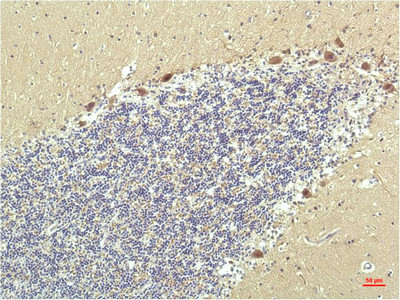![IHC-P analysis of mouse brain tissue using GTX34134 PPAR delta antibody [1D7]. Dilution : 1:200 IHC-P analysis of mouse brain tissue using GTX34134 PPAR delta antibody [1D7]. Dilution : 1:200](https://www.genetex.com/upload/website/prouct_img/normal/GTX34134/GTX34134_20200622_IHC-P_379_w_23060801_696.webp)
IHC-P analysis of mouse brain tissue using GTX34134 PPAR delta antibody [1D7]. Dilution : 1:200
PPAR delta antibody [1D7]
GTX34134
ApplicationsImmunoHistoChemistry, ImmunoHistoChemistry Paraffin
Product group Antibodies
ReactivityHuman, Mouse
TargetPPARD
Overview
- SupplierGeneTex
- Product NamePPAR delta antibody [1D7]
- Delivery Days Customer9
- Application Supplier NoteIHC-P: 1:100-1:200. *Optimal dilutions/concentrations should be determined by the researcher.Not tested in other applications.
- ApplicationsImmunoHistoChemistry, ImmunoHistoChemistry Paraffin
- CertificationResearch Use Only
- ClonalityMonoclonal
- Clone ID1D7
- Concentration1 mg/ml
- ConjugateUnconjugated
- Gene ID5467
- Target namePPARD
- Target descriptionperoxisome proliferator activated receptor delta
- Target synonymsFAAR, NR1C2, NUC1, NUCI, NUCII, PPARB, peroxisome proliferator-activated receptor delta, PPAR-beta, PPAR-delta, PPARD/MYO1D fusion, nuclear hormone receptor 1, nuclear receptor subfamily 1 group C member 2, peroxisome proliferator-activated receptor beta
- HostMouse
- IsotypeIgG1
- Protein IDQ03181
- Protein NamePeroxisome proliferator-activated receptor delta
- Scientific DescriptionThis gene encodes a member of the peroxisome proliferator-activated receptor (PPAR) family. The encoded protein is thought to function as an integrator of transcriptional repression and nuclear receptor signaling. It may inhibit the ligand-induced transcriptional activity of peroxisome proliferator activated receptors alpha and gamma, though evidence for this effect is inconsistent. Expression of this gene in colorectal cancer cells may be variable but is typically relatively low. Knockout studies in mice suggested a role for this protein in myelination of the corpus callosum, lipid metabolism, differentiation, and epidermal cell proliferation. Alternative splicing results in multiple transcript variants encoding distinct protein isoforms. [provided by RefSeq, Aug 2017]
- ReactivityHuman, Mouse
- Storage Instruction-20°C or -80°C,2°C to 8°C
- UNSPSC12352203

![IHC-P analysis of human brain tissue using GTX34134 PPAR delta antibody [1D7]. Dilution : 1:200 IHC-P analysis of human brain tissue using GTX34134 PPAR delta antibody [1D7]. Dilution : 1:200](https://www.genetex.com/upload/website/prouct_img/normal/GTX34134/GTX34134_20200622_IHC-P_261_w_23060801_334.webp)


![IHC-P analysis of human brain tissue using GTX34133 PPAR delta antibody [2F9]. Dilution : 1:200](https://www.genetex.com/upload/website/prouct_img/normal/GTX34133/GTX34133_20200622_IHC-P_260_w_23060801_899.webp)


